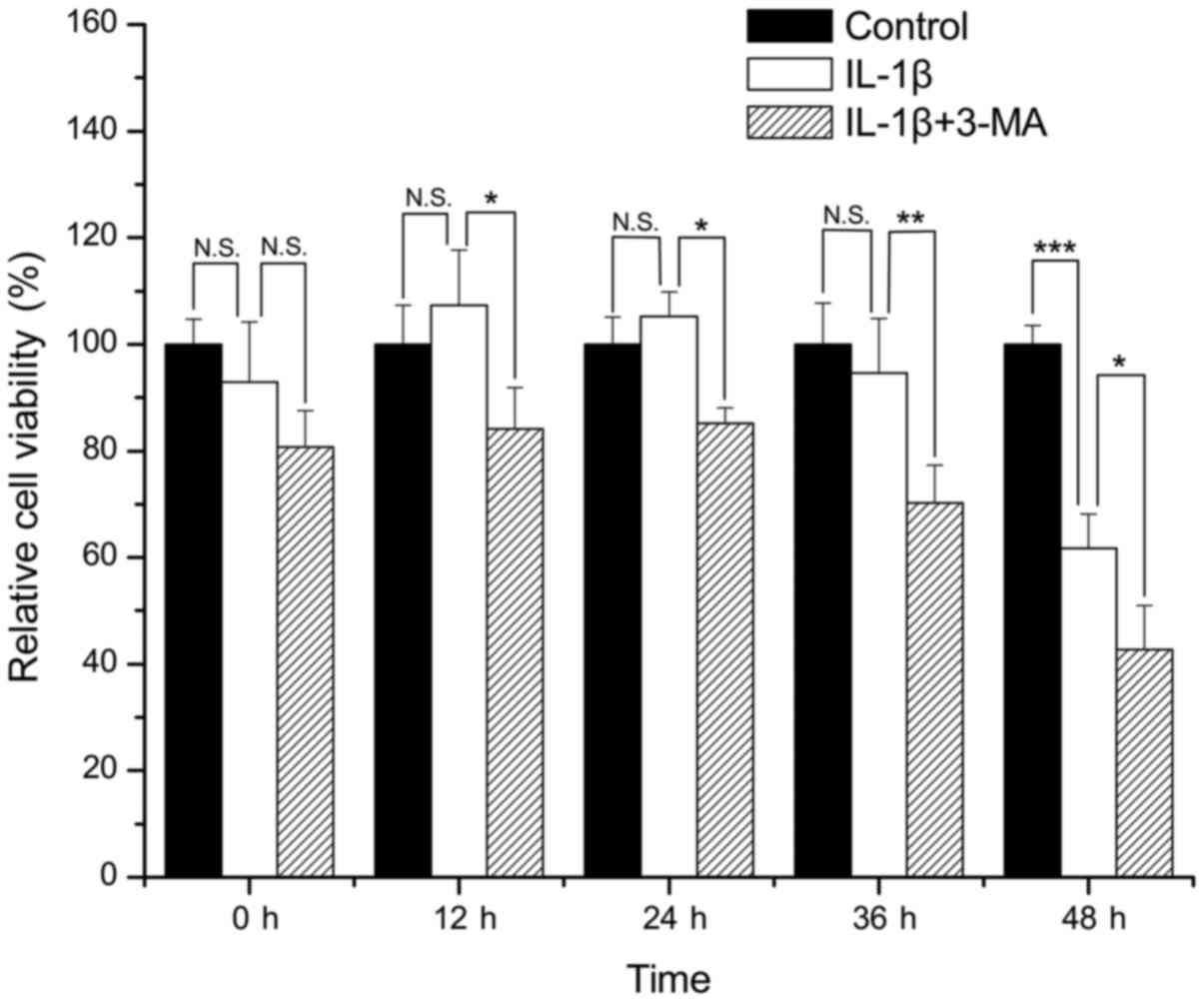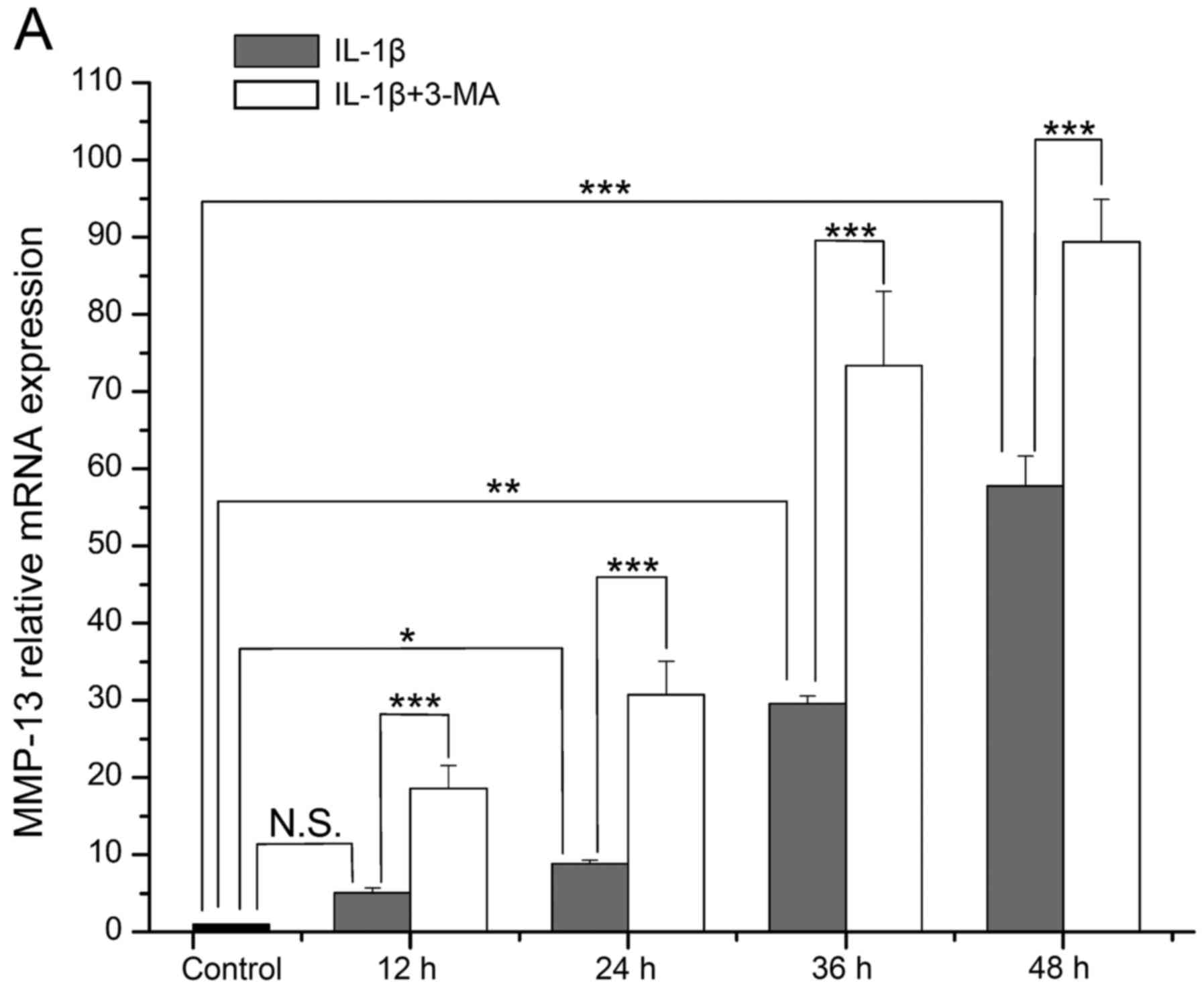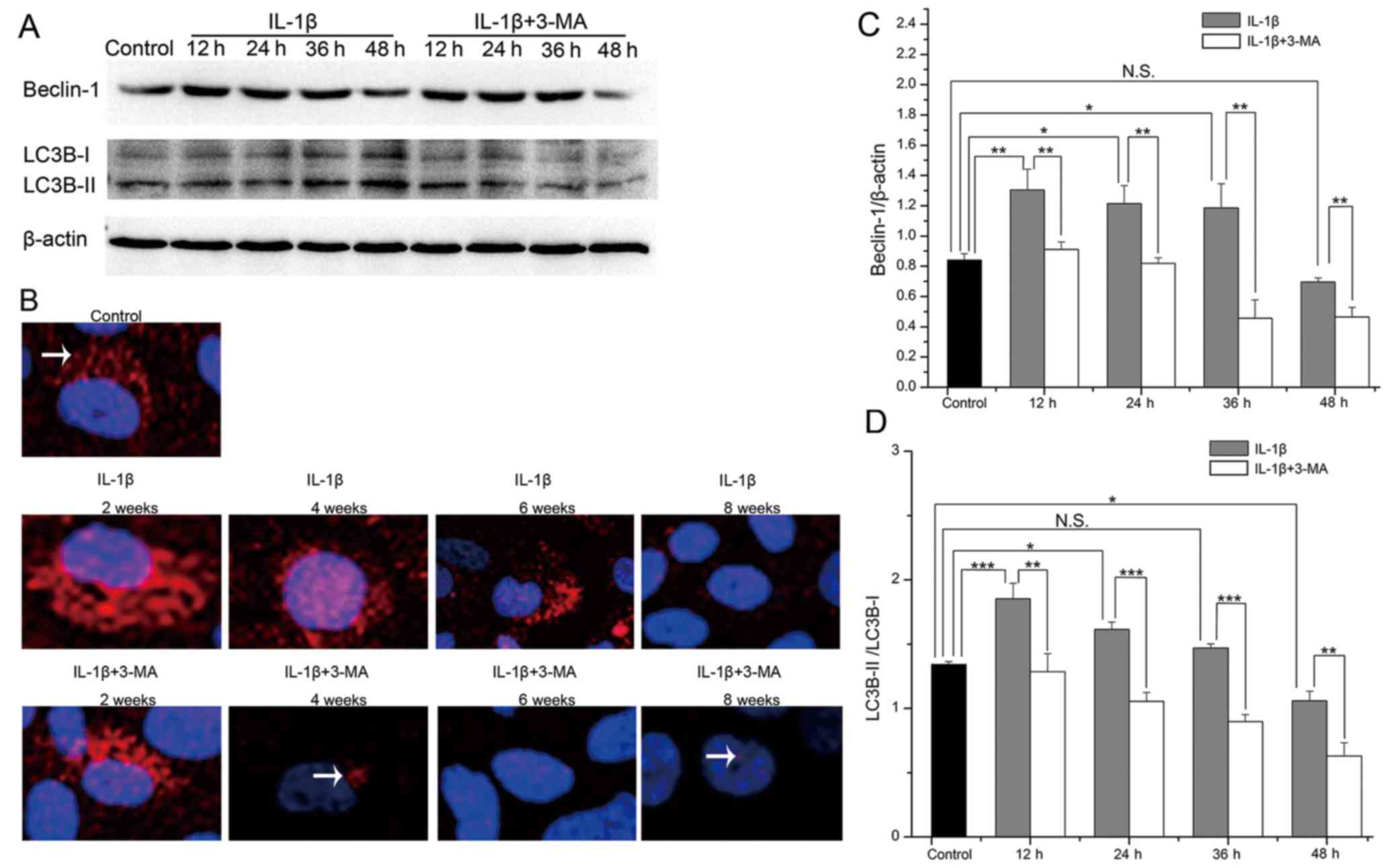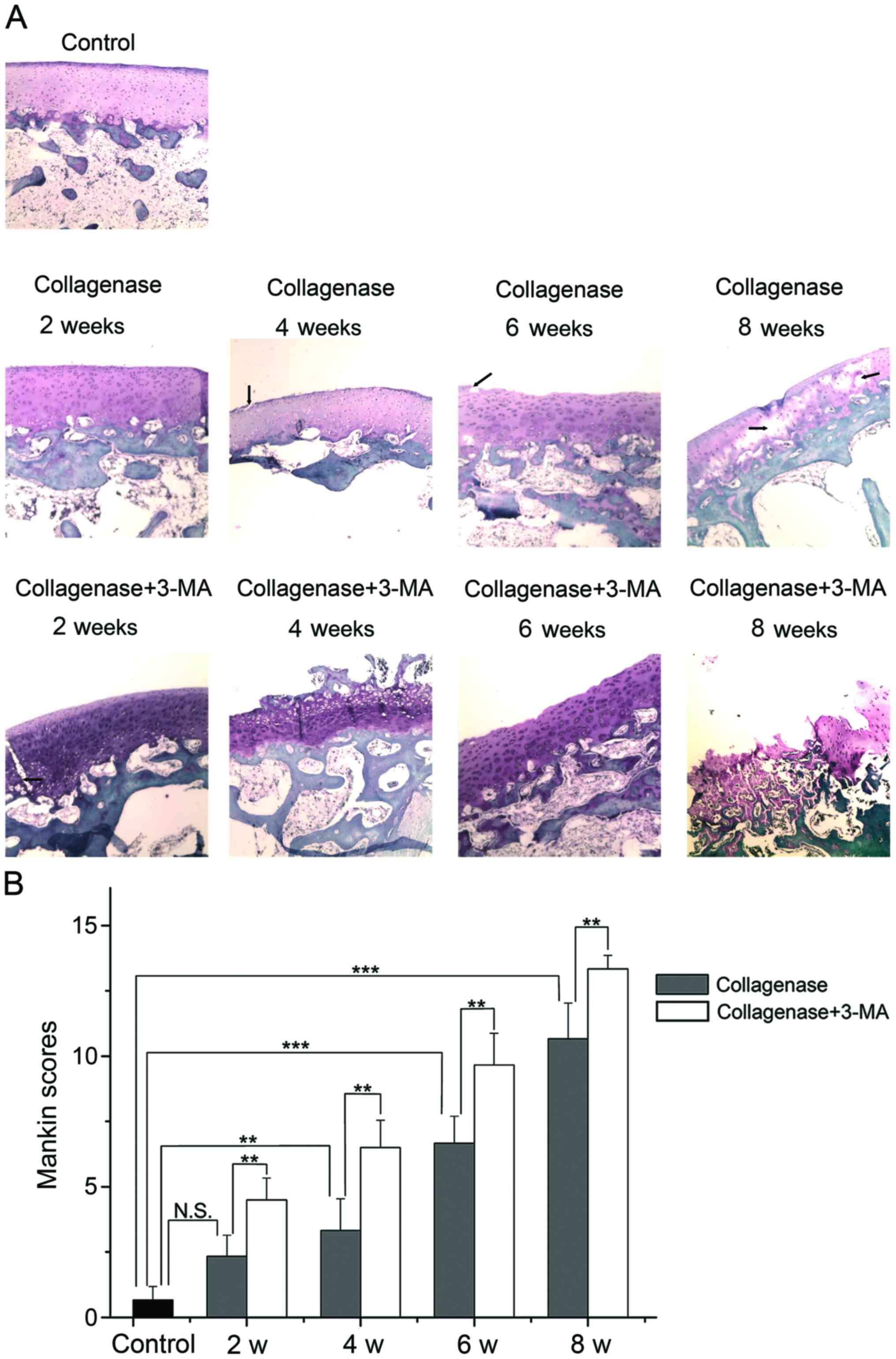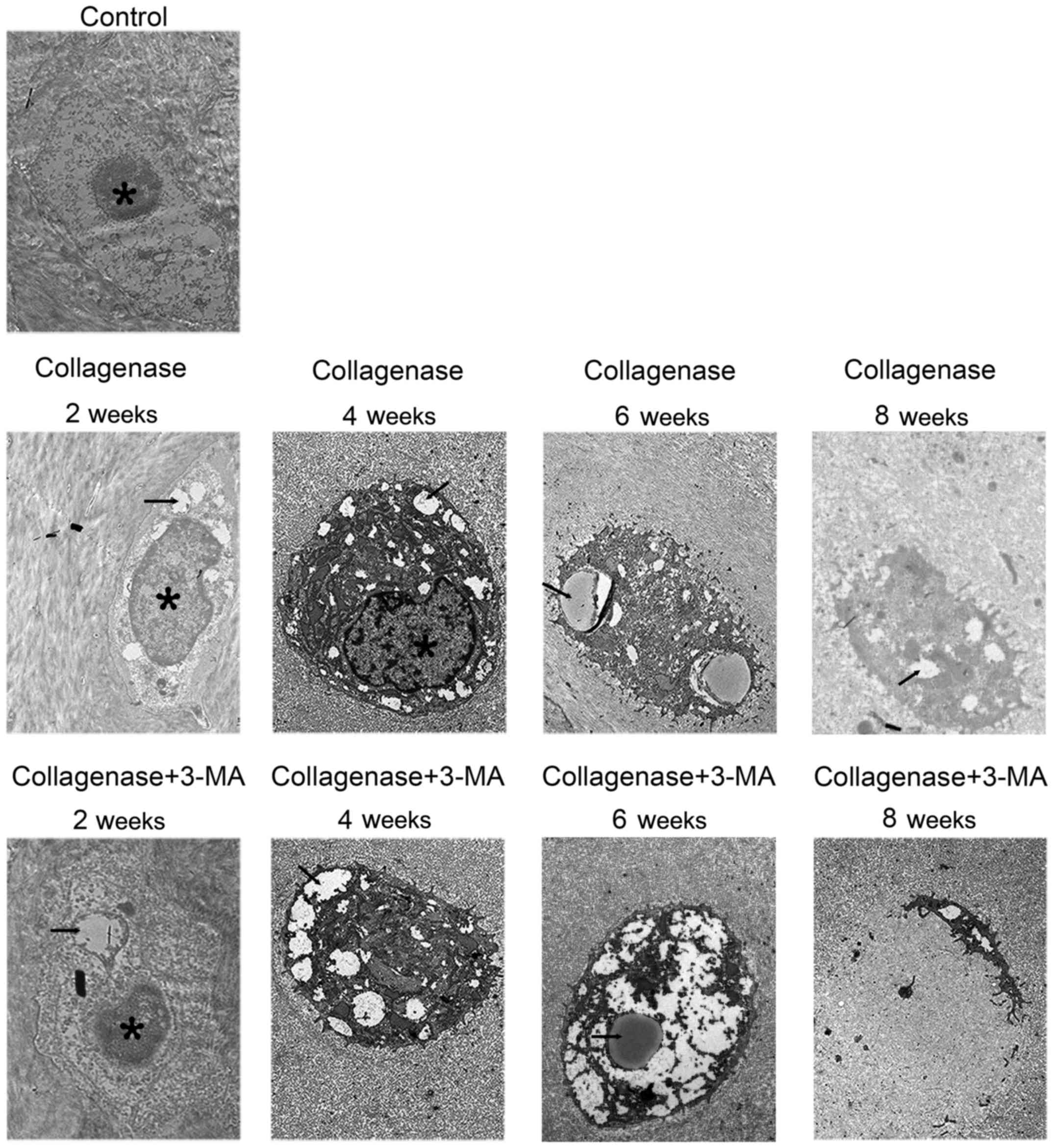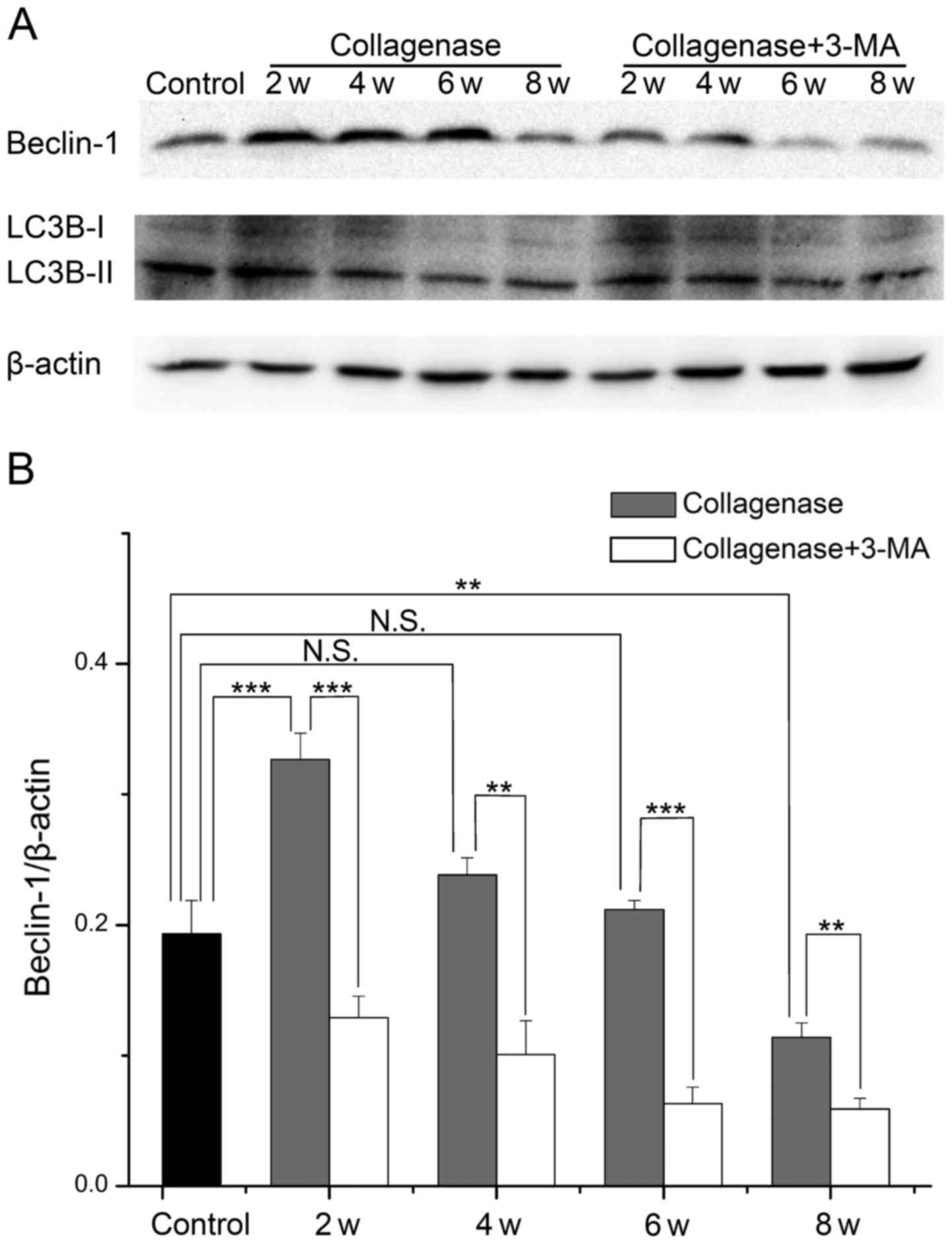|
1
|
Buckland J: Osteoarthritis: targeting
cartilage erosion in OA. Nat Rev Rheumatol. 6:642010. View Article : Google Scholar : PubMed/NCBI
|
|
2
|
Lahm A, Kasch R, Mrosek E, Spank H,
Erggelet C, Esser J and Merk H: Semiquantitative analysis of ECM
molecules in the different cartilage layers in early and advanced
osteoarthritis of the knee joint. Histol Histopathol. 27:609–615.
2012.PubMed/NCBI
|
|
3
|
Wang JH, Shih KS, Wu YW, Wang AW and Yang
CR: Histone deacetylase inhibitors increase microRNA-146a
expression and enhance negative regulation of interleukin-1β
signaling in osteoarthritis fibroblast-like synoviocytes.
Osteoarthritis Cartilage. 21:1987–1996. 2013. View Article : Google Scholar : PubMed/NCBI
|
|
4
|
Hui W, Young DA, Rowan AD, Xu X, Cawston
TE and Proctor CJ: Oxidative changes and signalling pathways are
pivotal in initiating age-related changes in articular cartilage.
Ann Rheum Dis. 75:449–458. 2016. View Article : Google Scholar :
|
|
5
|
Kim HJ, So HS, Lee JH, Park C, Lee JB,
Youn MJ, Kim SJ, Yang SH, Lee KM, Kwon KB, et al: Role of
proinflammatory cytokines in cisplatin-induced vestibular hair cell
damage. Head Neck. 30:1445–1456. 2008. View Article : Google Scholar : PubMed/NCBI
|
|
6
|
Kikuchi T, Sakuta T and Yamaguchi T:
Intra-articular injection of collagenase induces experimental
osteoarthritis in mature rabbits. Osteoarthritis Cartilage.
6:177–186. 1998. View Article : Google Scholar : PubMed/NCBI
|
|
7
|
Adães S, Ferreira-Gomes J, Mendonça M,
Almeida L, Castro-Lopes JM and Neto FL: Injury of primary afferent
neurons may contribute to osteoarthritis induced pain: an
experimental study using the collagenase model in rats.
Osteoarthritis Cartilage. 23:914–924. 2015. View Article : Google Scholar : PubMed/NCBI
|
|
8
|
Adães S, Mendonça M, Santos TN,
Castro-Lopes JM, Ferreira-Gomes J and Neto FL: Intra-articular
injection of collagenase in the knee of rats as an alternative
model to study nociception associated with osteoarthritis.
Arthritis Res Ther. 16:R102014. View
Article : Google Scholar : PubMed/NCBI
|
|
9
|
Klatt AR, Klinger G, Paul-Klausch B, Kühn
G, Renno JH, Wagener R, Paulsson M, Schmidt J, Malchau G and
Wielckens K: Matrilin-3 activates the expression of
osteoarthritis-associated genes in primary human chondrocytes. FEBS
Lett. 583:3611–3617. 2009. View Article : Google Scholar : PubMed/NCBI
|
|
10
|
Naito K, Takahashi M, Kushida K, Suzuki M,
Ohishi T, Miura M, Inoue T and Nagano A: Measurement of matrix
metalloproteinases (MMPs) and tissue inhibitor of
metalloproteinases-1 (TIMP-1) in patients with knee osteoarthritis:
comparison with generalized osteoarthritis. Rheumatology (Oxford).
38:510–515. 1999. View Article : Google Scholar
|
|
11
|
Yang L, Guo A and Gu JC: c-Jun N-terminal
kinase and nuclear factor κB mediate nitric oxide-induced
expression of matrix metalloproteinase-13. Int Orthop.
35:1261–1266. 2011. View Article : Google Scholar
|
|
12
|
Ryter SW, Cloonan SM and Choi AM:
Autophagy: a critical regulator of cellular metabolism and
homeostasis. Mol Cells. 36:7–16. 2013. View Article : Google Scholar : PubMed/NCBI
|
|
13
|
Murrow L and Debnath J: Autophagy as a
stress-response and quality-control mechanism: implications for
cell injury and human disease. Annu Rev Pathol. 8:105–137. 2013.
View Article : Google Scholar
|
|
14
|
Wang SY, Yu QJ, Zhang RD and Liu B: Core
signaling pathways of survival/death in autophagy-related cancer
networks. Int J Biochem Cell Biol. 43:1263–1266. 2011. View Article : Google Scholar : PubMed/NCBI
|
|
15
|
Chang J, Wang W, Zhang H, Hu Y, Wang M and
Yin Z: The dual role of autophagy in chondrocyte responses in the
pathogenesis of articular cartilage degeneration in osteoarthritis.
Int J Mol Med. 32:1311–1318. 2013.PubMed/NCBI
|
|
16
|
Klionsky DJ, Cregg JM, Dunn WA Jr, Emr SD,
Sakai Y, Sandoval IV, Sibirny A, Subramani S, Thumm M, Veenhuis M,
et al: A unified nomenclature for yeast autophagy-related genes.
Dev Cell. 5:539–545. 2003. View Article : Google Scholar : PubMed/NCBI
|
|
17
|
Liang XH, Jackson S, Seaman M, Brown K,
Kempkes B, Hibshoosh H and Levine B: Induction of autophagy and
inhibition of tumorigenesis by beclin 1. Nature. 402:672–676. 1999.
View Article : Google Scholar : PubMed/NCBI
|
|
18
|
Ravikumar B, Sarkar S, Davies JE, Futter
M, Garcia-Arencibia M, Green-Thompson ZW, Jimenez-Sanchez M,
Korolchuk VI, Lichtenberg M, Luo S, et al: Regulation of mammalian
autophagy in physiology and pathophysiology. Physiol Rev.
90:1383–1435. 2010. View Article : Google Scholar : PubMed/NCBI
|
|
19
|
Klionsky DJ, Abeliovich H, Agostinis P,
Agrawal DK, Aliev G, Askew DS, Baba M, Baehrecke EH, Bahr BA,
Ballabio A, et al: Guidelines for the use and interpretation of
assays for monitoring autophagy in higher eukaryotes. Autophagy.
4:151–175. 2008. View Article : Google Scholar : PubMed/NCBI
|
|
20
|
Kabeya Y, Mizushima N, Ueno T, Yamamoto A,
Kirisako T, Noda T, Kominami E, Ohsumi Y and Yoshimori T: LC3, a
mammalian homologue of yeast Apg8p, is localized in autophagosome
membranes after processing. EMBO J. 19:5720–5728. 2000. View Article : Google Scholar : PubMed/NCBI
|
|
21
|
Caramés B, Olmer M, Kiosses WB and Lotz
MK: The relationship of autophagy defects to cartilage damage
during joint aging in a mouse model. Arthritis Rheumatol.
67:1568–1576. 2015. View Article : Google Scholar : PubMed/NCBI
|
|
22
|
Barranco C: Osteoarthritis: activate
autophagy to prevent cartilage degeneration? Nat Rev Rheumatol.
11:1272015. View Article : Google Scholar : PubMed/NCBI
|
|
23
|
Zhang M, Zhang J, Lu L, Qiu ZY, Zhang X,
Yu SB, Wu YP and Wang MQ: Enhancement of chondrocyte autophagy is
an early response in the degenerative cartilage of the
temporomandibular joint to biomechanical dental stimulation.
Apoptosis. 18:423–434. 2013. View Article : Google Scholar : PubMed/NCBI
|
|
24
|
Li X, Lang W, Ye H, Yu F, Li H, Chen J,
Cai L, Chen W, Lin R, Huang Y, et al: Tougu Xiaotong capsule
inhibits the tidemark replication and cartilage degradation of
papain-induced osteoarthritis by the regulation of chondrocyte
autophagy. Int J Mol Med. 31:1349–1356. 2013.PubMed/NCBI
|
|
25
|
Almonte-Becerril M, Navarro-Garcia F,
Gonzalez-Robles A, Vega-Lopez MA, Lavalle C and Kouri JB: Cell
death of chondrocytes is a combination between apoptosis and
autophagy during the pathogenesis of Osteoarthritis within an
experimental model. Apoptosis. 15:631–638. 2010. View Article : Google Scholar : PubMed/NCBI
|
|
26
|
Caramés B, Taniguchi N, Otsuki S, Blanco
FJ and Lotz M: Autophagy is a protective mechanism in normal
cartilage, and its aging-related loss is linked with cell death and
osteoarthritis. Arthritis Rheum. 62:791–801. 2010. View Article : Google Scholar : PubMed/NCBI
|
|
27
|
Benito MJ, Veale DJ, FitzGerald O, van den
Berg WB and Bresnihan B: Synovial tissue inflammation in early and
late osteoarthritis. Ann Rheum Dis. 64:1263–1267. 2005. View Article : Google Scholar : PubMed/NCBI
|
|
28
|
Mankin HJ, Johnson ME and Lippiello L:
Biochemical and metabolic abnormalities in articular cartilage from
osteoarthritic human hips. III. Distribution and metabolism of
amino sugar-containing macromolecules. J Bone Joint Surg Am.
63:131–139. 1981. View Article : Google Scholar : PubMed/NCBI
|
|
29
|
van der Kraan PM: Understanding
developmental mechanisms in the context of osteoarthritis. Curr
Rheumatol Rep. 15:3332013. View Article : Google Scholar : PubMed/NCBI
|
|
30
|
Goldring MB and Goldring SR:
Osteoarthritis. J Cell Physiol. 213:626–634. 2007. View Article : Google Scholar : PubMed/NCBI
|
|
31
|
Wu X, Kondragunta V, Kornman KS, Wang HY,
Duff GW, Renner JB and Jordan JM: IL-1 receptor antagonist gene as
a predictive biomarker of progression of knee osteoarthritis in a
population cohort. Osteoarthritis Cartilage. 21:930–938. 2013.
View Article : Google Scholar : PubMed/NCBI
|
|
32
|
Santangelo KS, Nuovo GJ and Bertone AL: In
vivo reduction or blockade of interleukin-1β in primary
osteoarthritis influences expression of mediators implicated in
pathogenesis. Osteoarthritis Cartilage. 20:1610–1618. 2012.
View Article : Google Scholar : PubMed/NCBI
|
|
33
|
Bucknor MD, Nardo L, Joseph GB, Alizai H,
Srikhum W, Nevitt MC, Lynch JA, McCulloch CE and Link TM:
Association of cartilage degeneration with four year weight gain -
3T MRI data from the Osteoarthritis Initiative. Osteoarthritis
Cartilage. 23:525–531. 2015. View Article : Google Scholar : PubMed/NCBI
|
|
34
|
Botter SM, van Osch GJ, Waarsing JH, van
der Linden JC, Verhaar JA, Pols HA, van Leeuwen JP and Weinans H:
Cartilage damage pattern in relation to subchondral plate thickness
in a collagenase-induced model of osteoarthritis. Osteoarthritis
Cartilage. 16:506–514. 2008. View Article : Google Scholar
|
|
35
|
Roman-Blas JA, Contreras-Blasco MA, Largo
R, Alvarez-Soria MA, Castañeda S and Herrero-Beaumont G:
Differential effects of the antioxidant n-acetylcysteine on the
production of catabolic mediators in IL-1beta-stimulated human
osteoarthritic synoviocytes and chondrocytes. Eur J Pharmacol.
623:125–131. 2009. View Article : Google Scholar : PubMed/NCBI
|
|
36
|
Schaefer JF, Millham ML, de Crombrugghe B
and Buckbinder L: FGF signaling antagonizes cytokine-mediated
repression of Sox9 in SW1353 chondrosarcoma cells. Osteoarthritis
Cartilage. 11:233–241. 2003. View Article : Google Scholar : PubMed/NCBI
|
|
37
|
Lu YC, Jayakumar T, Duann YF, Chou YC,
Hsieh CY, Yu SY, Sheu JR and Hsiao G: Chondroprotective role of
sesamol by inhibiting MMPs expression via retaining NF-κB signaling
in activated SW1353 cells. J Agric Food Chem. 59:4969–4978. 2011.
View Article : Google Scholar : PubMed/NCBI
|
|
38
|
Tetsunaga T, Nishida K, Furumatsu T,
Naruse K, Hirohata S, Yoshida A, Saito T and Ozaki T: Regulation of
mechanical stress-induced MMP-13 and ADAMTS-5 expression by RUNX-2
transcriptional factor in SW1353 chondrocyte-like cells.
Osteoarthritis Cartilage. 19:222–232. 2011. View Article : Google Scholar
|
|
39
|
Kwon DR, Park GY and Lee SU: The effects
of intra-articular platelet-rich plasma injection according to the
severity of collagenase-induced knee osteoarthritis in a rabbit
model. Ann Rehabil Med. 36:458–465. 2012. View Article : Google Scholar : PubMed/NCBI
|
|
40
|
Kim SB, Kwon DR, Kwak H, Shin YB, Han HJ,
Lee JH and Choi SH: Additive effects of intra-articular injection
of growth hormone and hyaluronic acid in rabbit model of
collagenase-induced osteoarthritis. J Korean Med Sci. 25:776–780.
2010. View Article : Google Scholar : PubMed/NCBI
|
|
41
|
Hulth A, Lindberg L and Telhag H:
Experimental osteoarthritis in rabbits. Preliminary report. Acta
Orthop Scand. 41:522–530. 1970. View Article : Google Scholar : PubMed/NCBI
|
|
42
|
Xu H, Xiong S, Wang H, Zhang M and Yu Y:
The evidence and the possible significance of autophagy in
degeneration model of human cervical end-plate cartilage. Exp Ther
Med. 7:537–542. 2014.PubMed/NCBI
|
|
43
|
Yang RT, Zhang C, Liu Y, Zhou HH and Li
ZB: Autophagy prior to chondrocyte cell death during the
degeneration of Meckel's cartilage. Anat Rec (Hoboken).
295:734–741. 2012. View
Article : Google Scholar
|
|
44
|
Zhang Y, Vasheghani F, Li YH, Blati M,
Simeone K, Fahmi H, Lussier B, Roughley P, Lagares D, Pelletier JP,
et al: Cartilage-specific deletion of mTOR upregulates autophagy
and protects mice from osteoarthritis. Ann Rheum Dis. 74:1432–1440.
2015. View Article : Google Scholar
|
|
45
|
Mizushima N, Yoshimori T and Levine B:
Methods in mammalian autophagy research. Cell. 140:313–326. 2010.
View Article : Google Scholar : PubMed/NCBI
|















